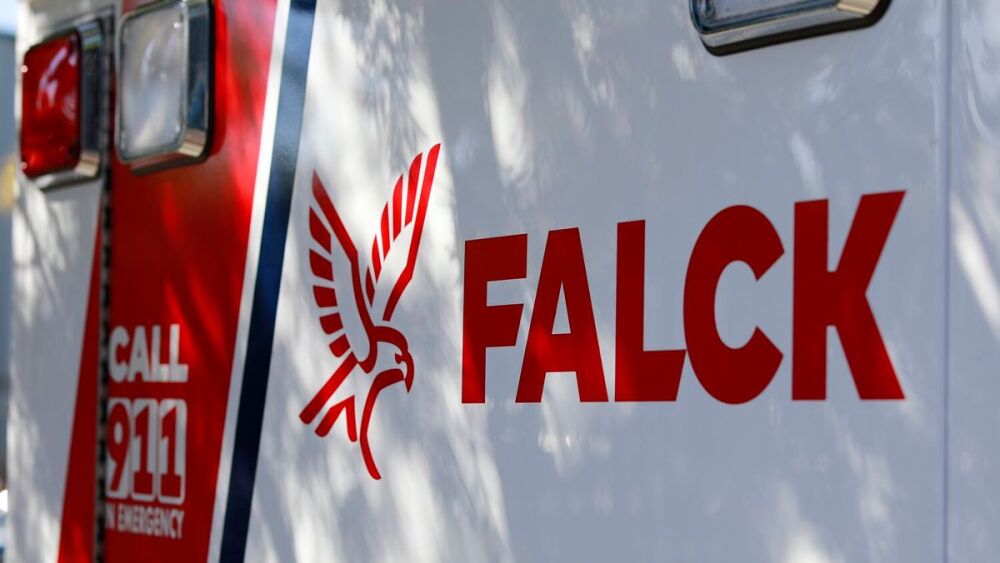By David Garrick
The San Diego Union-Tribune
SAN DIEGO — With San Diego’s new ambulance provider still falling far short of staffing and response-time goals, city leaders promised Wednesday to take drastic action in January that could include adding a second ambulance provider.
Another solution discussed Wednesday is supplementing the staff of ambulance provider Falck USA with city paramedics. City officials may also take the service away from Falck entirely and merge it into the city’s Fire-Rescue Department.
The city hired a consultant last spring to spend six months studying that option, which would bring San Diego in line with Los Angeles and San Francisco. Officials didn’t say Wednesday when the consultant’s report would be available.
Falck was chosen last year to replace longtime provider American Medical Response because Falck promised to improve service, but the company hasn’t come close to fulfilling those promises.
Not only hasn’t it kept its promise to increase daily ambulance hours across the city from 840 to 1,008, Falck also hasn’t met the minimum of 900 daily hours required by its city contract in any month since taking over last November.
And new numbers unveiled Wednesday show things are getting worse, not better. Average daily hours dropped from 810 in July to 768 in August, then fell to 756 in September.
Response time data for those months aren’t yet available, but a Falck official acknowledged Wednesday that the company will be facing fines in multiple response-time categories for September.
The shortfall in daily ambulance hours — the total number of on-duty hours for all ambulances operating in the city on a particular day — and the poor response times are primarily the result of staffing shortages. Those shortages force Falck to leave several ambulances unstaffed and dormant on most days.
Falck has 109 full-time paramedics available to work, well short of the 134 needed and the 148 it would like to have so it can cover vacations and sick days.And the company has 162 emergency medical technicians, 32 below its goal.
Those numbers are down from May, when the company had 116 paramedics and 194 EMTs.
“This is something we’ve been challenged with for a year now, and it’s not getting any better,” Fire Chief Colin Stowell told the City Council’s public safety committee on Wednesday. “We can’t just wait for it to get better. We’ve got to start making some of these changes.”
Stowell declined to say specifically what would happen in January, but he said options likely to be chosen include a new deal with Falck that boosts service — or something more drastic.
Councilmember Marni von Wilpert suggested adding a second ambulance provider to supplement Falck’s staff and neighborhood coverage.
“I need in January to have concrete action steps,” she said.
The leader of the labor union representing Falck’s local paramedics and EMTs, Tony Sorci, said city workers are a possibility.
“It’s our belief this may result in city of San Diego Fire- Rescue having to take greater responsibilities and extra measures to cover this increasing number of unstaffed shifts with San Diego Fire- Rescue paramedics,” Sorci said.
Sorci also painted a bleak picture of working conditions for his members, who are forced under their contract to work mandatory overtime shifts.
“Our members share experiences of helplessness and mental anguish that has resulted in increased numbers of physical injuries, illnesses, PTSD and serious clinical depression,” he said. “The physical and mental impacts of these working conditions ... are devastating.”
Sorci, who blamed low pay and egregious working conditions for the staffing problems, said the dormant ambulances are slowing response times and leaving many neighborhoods without adequate coverage.
“These delays in the dispatching of ambulances have resulted in response times of up to 30 minutes or more, as ambulances respond from as far north as Carmel Mountain or farther to areas of Encanto, downtown or the South Bay,” he said.
Jeff Behm, leader of Falck’s local operations, defended his company’s performance. But he didn’t express the usual optimism that staffing problems would soon be solved.
Instead, Behm provided many reasons for the failures, including a national shortage of paramedics since the pandemic and delays dropping off patients at hospitals, which can tie up Falck ambulances for lengthy periods.
Sorci said the national shortage is a bogus excuse for Falck failing to hire enough paramedics locally, because Falck competitor AMR has a surplus of workers in San Diego. But Behm noted that AMR is struggling with shortages in other parts of the nation.
Local hospitals say Falck is partly to blame for the delays, contending it takes some patients to hospitals unnecessarily because it doesn’t get paid otherwise.
Behm said Falck paramedics and EMTs don’t get bonuses or any additional compensation for taking a patient to hospital, arguing they have no incentive to make unnecessary hospital trips.
“It’s hard for us to sift through all this competing data and finger-pointing,” said von Wilpert, stressing that the problems need to be solved no matter what their causes. “The point is, the contract is not being adhered to.”
___
This story originally appeared in San Diego Union-Tribune.
©2022 The San Diego Union-Tribune. Visit sandiegouniontribune.com. Distributed by Tribune Content Agency, LLC.












